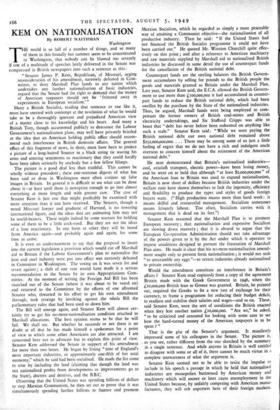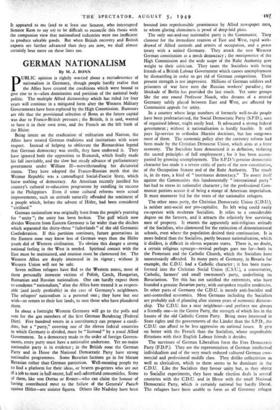KEM ON NATIONALISATION
By ROBERT WAITIIMAN
Washington
THE world is so full of a number of things, and so many of them in this brutally hot summer seem to be concentrated in Washington, that nobody can be blamed too severely if one of a multitude of speeches lately delivered in the Senate was compressed in British newspapers into such a sentence as this:
" Senator James P. Kern, Republican,. of Missouri, urging reconsideration of his amendment, narrowly defeated in Com- mittee, to deny Marshall Plan funds to any nation which undertakes any further nationalisation of basic industries, argued that the Senate had the right to demand that the money of American taxpayers should not be ' frittered away in experiments in European socialism.'" Many a British Socialist, reading that sentence or one like it, must have snorted with contempt at the revelation of what he would take to be a thoroughly ignorant and prejudiced American view of a matter close to his knowledge and his heart. And many a British Tory, though accustomed publicly to denounce the Labour Government's nationalisation plans, may well have privately bristled at the idea that an American holding public office should recom- mend such interference in British domestic affairs. The general effect of this fragment of news, in short, must have been to project a picture of a long-haired Senator in a black string tie waving his arms and uttering sentiments so reactionary that they could hardly have been taken seriously by anybody but a few fellow blimps.
The picture is a good deal less than truthful. This cannot be wholly without precedent ; these one-sentence digests of what has been said or done in Washington must often conjure up false images in Britain. In general it is difficult to see what can be done about it—at least until there is newsprint enough to go into almost everything at more length and with greater care. The case of Senator Kern is just one that might profitably be examined with more attention than it can have received. The Senator, though a noted Missouri lawyer and graduate of Harvard, is no towering international figure, and the ideas that are animating him may not be world-beaters. There might indeed be some warrant for holding some of them to be a little cock-eyed. But they are not the ideas of a lone reactionary. In one form or other they will be heard from America again—and probably again and again, for some time to come.
It is even an understatement to say that the proposal to insert into the current legislation a provision which would cut off Marshall aid to Britain if the Labour Government's plan to nationalise the iron and steel industry were put into effect was narrowly defeated in Committee in Washington. The voting on it was seven for and seven against ; a shift of one vote would have made it a serious recommendation to the Senate by its own Appropriations Com- mittee. At the moment of writing the Foreign Aid Bill has been snatched out of the Senate (where it was about to be voted on) and returned to the Committee by the efforts of one affronted Senator who, thwarted in his effort to get his own amendment through, took revenge by invoking against the whole Bill the parliamentary rules that had been used to down him.
The Bill will emerge again, and Senator Kern will almost cer- tainly try to get his no-more-nationalisation condition attached to Marshall allocations. The best opinion seems to be that he will fail. We shall see. But whether he succeeds or not there is no doubt at all that he has made himself a spokesman for a point of view to which some other Americans arc also attracted. I am concerned here not to advocate but to explain this point of view. Senator Kcm addressed the Senate in support of his amendment for more than two hours. He began by listing "nine of England's most important industries, or approximately one-fifth of her total economy," which he said had been socialised. He made the list come to nine by including the land (claiming that though the land was not nationalised profits from developments or improvements go to the State), doctors and dentists, and the B.B.C.
Observing that the United States was spending billions of dollars to stop Marxian Communism, he then set out to prove that it was simultaneously spending further billions to finance and promote Marxian Socialism, which he regarded as simply a more peaceable way of attaining a Communist objective—the nationalisation of all productive industry. Then he said: "If the United States had not financed the British Socialist programme it could not have been carried out." He quoted Mr. Winston Churchill quite effec- tively on this point ; and after a reference to American machinery and raw materials supplied by Marshall aid to nationalised British industries he discussed in some detail the use of counterpart funds for the cancellation of the British national debt.
Counterpart funds are the sterling balances the British Govern- ment accumulates by selling for pounds to the British people the goods and materials granted to Britain under the Marshall Plan. Last year, Senator Kern said, the E.C.A. allowed the British Govern- ment to use more than Ltoo,000,000 it had accumulated in counter- part funds to reduce the British national debt, which had been swollen by the purchase by the State of the nationalised industries. Thus, he argued, Marshall funds were being employed to com- pensate the former owners of British coal-mines and British electricity undertakings, and Sir Stafford Cripps was able to boast that "debt has never before been redeemed on anything like such a scale." Senator Kern said: "While we were paying the British national debt our own national debt remained above $252,000,000,000. ... There may be among some of us just a little feeling of regret that we do not have a rich and indulgent uncle overseas to concern himself about the retirement of the American national debt."
He next demonstrated that Britain's nationalised industries— coal, aviatioh transport, electric power—have been losing money, and he went on to hold that although "at least $2,000,000,000" of the American loan to Britain was used to expand nationalisation, Britain is now short of dollars because British industries under the welfare state have shown themselves to lack the ingenuity, efficiency and flexibility to produce the types and styles of goods foreign buyers want. ("High production means more than hard work: it means skilful and resourceful management. Socialism sometimes means leisurely labour. Too often, Socialism carries with it management that is dead on its feet.") Senator Kern reasoned that the Marshall Plan is to promote European recovery ; that nationalisation and expensive Socialism are slowing down recovery ; that it is absurd to argue that the European Co-operation Administration should not take advantage of the powers given to it by the Act under which it operates to impose conditions designed to prevent the frustration of Marshall Plan aims. He made it clear that his no-more-nationalisation amend- ment sought only to prevent fresh nationalisation ; it would not seek " to unscramble any eggs "—to return industries already nationalised to private ownership.
Would the amendment constitute an interference in Britain's affairs ? Senator Kern read copiously from a copy of the agreement Britain made with the Greek Government in 1946, when the kto,000,000 British loan to Greece was granted. Britain, he pointed out, required the Greeks to fix a new rate of exchange for their currency, to frame a programme for reducing their budget deficit, to readjust and stabilise their salaries and wages—and so on. These, said Senator Kern, were the sort of conditions the British exacted when they lent another nation £10,000,000. "Arc we," he asked, " to be criticised and censured for looking with some care to see how the hard-earned money of the American taxpayers is to be spent ? "
That is the gist of the Senator's argument. It manifestly impressed some of his colleagues in the Senate. The picture is, as you see, rather different from the one sketched by the summary in a single sentence. And while anyone in Britain is well entitled to disagree with some or all of it, there cannot be much virtue in a complete unawareness of what the argument is.
Senator Kern seemed not to be able to resist the impulse to include in his speech a passage in which he held that nationalised industries arc monopolies buttressed by American money and machinery which will sooner or later cause unemployment in the United States because, by unfairly competing with American manu- facturers, they will rob exporters here of their foreign markets.
It appeared to me (and to at least one Senator, who interrupted Senator Kern to say so) to be difficult to reconcile this thesis with the companion view that nationalised industries were too inefficient to produce saleable goods. But when British recovery and British exports are further advanced than they are now, we shall almost certainly hear more on these lines too.



































 Previous page
Previous page